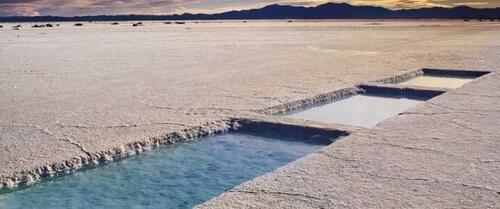Authored by Haley Zaremba via OilPrice.com,
-
Lithium is essential for the clean energy transition, but its extraction often involves severe environmental and health consequences.
-
AlkaLi, a startup company, aims to revolutionize lithium extraction with a lower environmental footprint and potentially make the US more competitive in lithium processing.
-
The demand for lithium is expected to increase dramatically in the coming years, driven by the growth of electric vehicles and renewable energy storage.
Lithium is essential to saving the world from climate change – but will it destroy the environment in the process?
Ironically, lithium extraction is just as associated with sharply negative environmental externalities as it is with clean and green energy initiatives. The communities where lithium is extracted are already suffering from dire health and ecological issues stemming from the extraction of the metal, but the lithium industry is just getting started. To avoid devastation for such communities, something about the lithium extraction process has to change drastically and soon.
Gradiant, a unicorn startup company that treats industrial wastewater, thinks that it has a solution to this rapidly expanding problem. It’s opening a new spin-off business called alkaLi which aims to extract lithium from naturally occurring brine and then process it for use in lithium-ion batteries via novel methods. The company’s innovative process “uses resins and membranes to more easily extract the lithium from brine, then relies on its own technology to concentrate the mineral, which ultimately is precipitated into a solid for use in batteries,” Forbes summarized in a recent report.
The team behind Gradiant and alkaLi believes that their disruptive lithium extraction and processing approach can turn the lithium industry on its head and jettison the budding AlkaLi into the stratosphere. “The demand side of lithium is crazy,” Gradiant co-founder and chief operating officer Prakash Govindan was quoted by Forbes. “We believe we can create a billion-dollar company just from the lithium business, but it is in the early stages of revenue.”
It’s true that the demand for lithium is going gangbusters and shows no signs of stopping. A 2023 report from Popular Mechanics calculated that “an electrified economy in 2030 will likely need anywhere from 250,000 to 450,000 tonnes of lithium.” By comparison, “In 2021, the world produced only 105—not 105,000—tonnes.”
The International Renewable Energy Agency (IRENA) corroborates this astronomical scale of growth. Its 2022 lithium report estimates that lithium demand for battery-making alone is expected to increase by a factor of ten over the decade between 2020 and 2030. These batteries will be essential to the global clean energy transition to power electric vehicles as well as to store variable renewable energy produced by solar and wind power.
But there are a few problems with the massive growth of lithium demand.
First is the aforementioned environmental impact of lithium mining and extraction. Lithium extraction is typically extremely water-intensive – according to a 2018 report from WIRED magazine, extracting a single ton of lithium requires approximately 500,000 liters of water. In a cruel irony, lithium is often found and extracted in extremely water-stressed areas, such as South America’s so-called ‘lithium triangle,’ which overlaps with the Atacama, the world’s driest desert. What’s more, extraction through brine ponds also poses a potential threat of contaminating existing, preciously scant water reserves.
Moreover, the chemicals involved in lithium extraction are extremely toxic. "The release of such chemicals through leeching [sic], spills or air emissions can harm communities, ecosystems and food production," reads a recent report from international environment activism group Friends of the Earth. "Moreover, lithium extraction inevitably harms the soil and also causes air contamination."
Finally, the lithium industry presents key geopolitical issues in its current form. While most lithium is extracted in Australia and South America, almost all lithium processing takes place in China, creating a potentially dangerous concentration of a vital supply chain.
AlkaLi claims that its lithium extraction and processing method has a lower water footprint and carbon footprint than typical methods, and that it’s 50% cheaper to boot. This means that they may not only have found a way to reduce the environmental harm that the lithium boom threatens to cause around the globe, but also allow for the United States to eventually become competitive with China – a target that the U.S. desperately seeks.
